Review: August Wilson's Tony Award-Winning JITNEY Examines the Effects of Gentrification on Family and Friendships in a Gypsy Cab Station
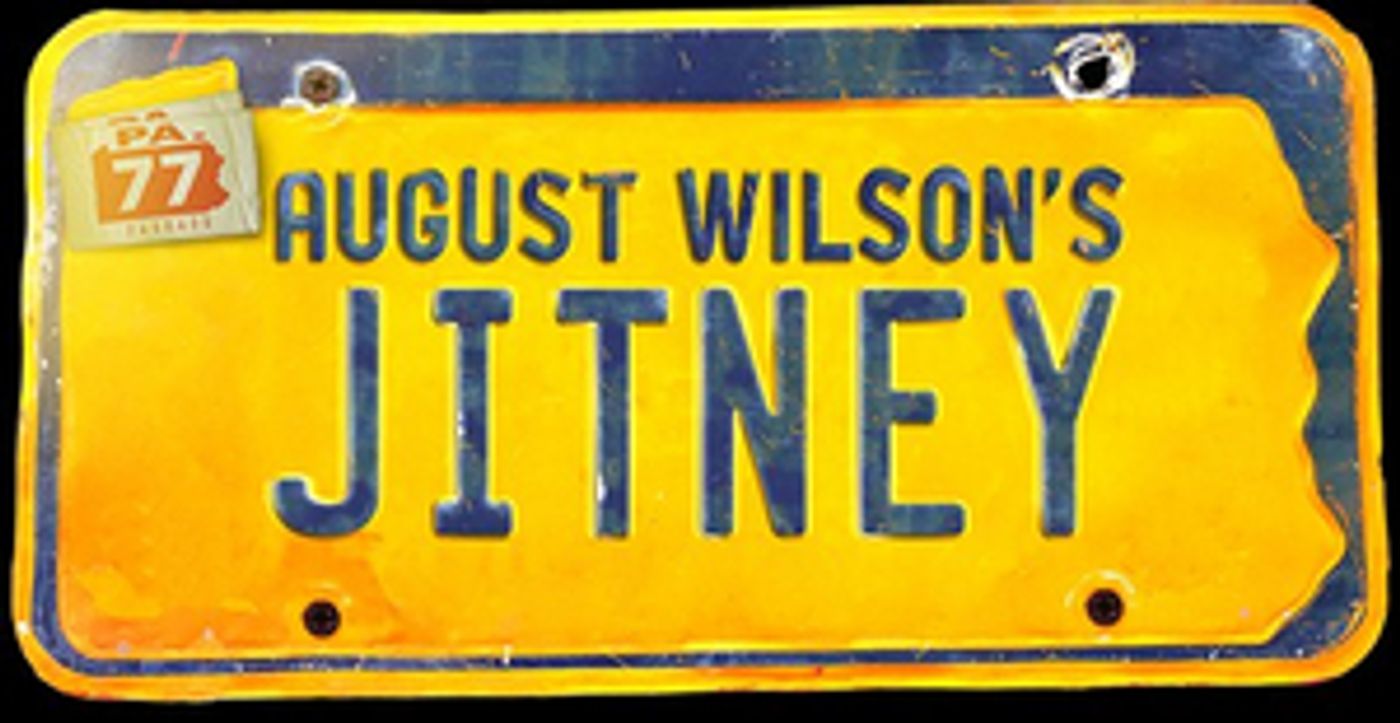
Originally presented by Manhattan Theatre Club, two-time Pulitzer winner August Wilson's JITNEY completed his American Century Cycle on Broadway and received the 2017 Tony Award for Best Revival of a Play. Now playing at the Mark Taper Forum, presented by Center Theatre Group, the intense drama is a richly textured piece set in the 1970s that follows a group of black men in a rundown building in Pittsburgh trying to eke out a living by driving unlicensed cabs, or jitneys.
 Brilliantly directed with insight and artistic nuance by Tony Award winner Ruben Santiago-Hudson, who earned a Tony nomination and Drama Desk Award for his direction of the Broadway debut of JITNEY and also directed the 2017 Broadway revival, the cast features, in alphabetical order, Francois Battiste, Harvy Blanks, Amari Cheatom, Anthony Chisholm, Brian D. Coats, Steven Anthony Jones, Nija Okoro, Keith Randolph Smith and Ray Anthony Thomas. Having such a talented director so familiar with these characters and their intertwining relationships brings a greater understanding of the love, jealousy, hurt and hardship taking place during the one-room, almost 3 hours long, drama.
Brilliantly directed with insight and artistic nuance by Tony Award winner Ruben Santiago-Hudson, who earned a Tony nomination and Drama Desk Award for his direction of the Broadway debut of JITNEY and also directed the 2017 Broadway revival, the cast features, in alphabetical order, Francois Battiste, Harvy Blanks, Amari Cheatom, Anthony Chisholm, Brian D. Coats, Steven Anthony Jones, Nija Okoro, Keith Randolph Smith and Ray Anthony Thomas. Having such a talented director so familiar with these characters and their intertwining relationships brings a greater understanding of the love, jealousy, hurt and hardship taking place during the one-room, almost 3 hours long, drama.And what a gloriously realistic one-room set it is, designed with the utmost attention to detail by David Gallo, lit to perfection by Jane Cox, with sound design by Darron L. West and Charles Coes, with original music by Bill Sims Jr. filling the space with all the emotional background required to bring such musical finesse to the entire production.
Cut from headlines which always seem to be in the news, JITNEY takes place when the city threatens to board up the business where independent men 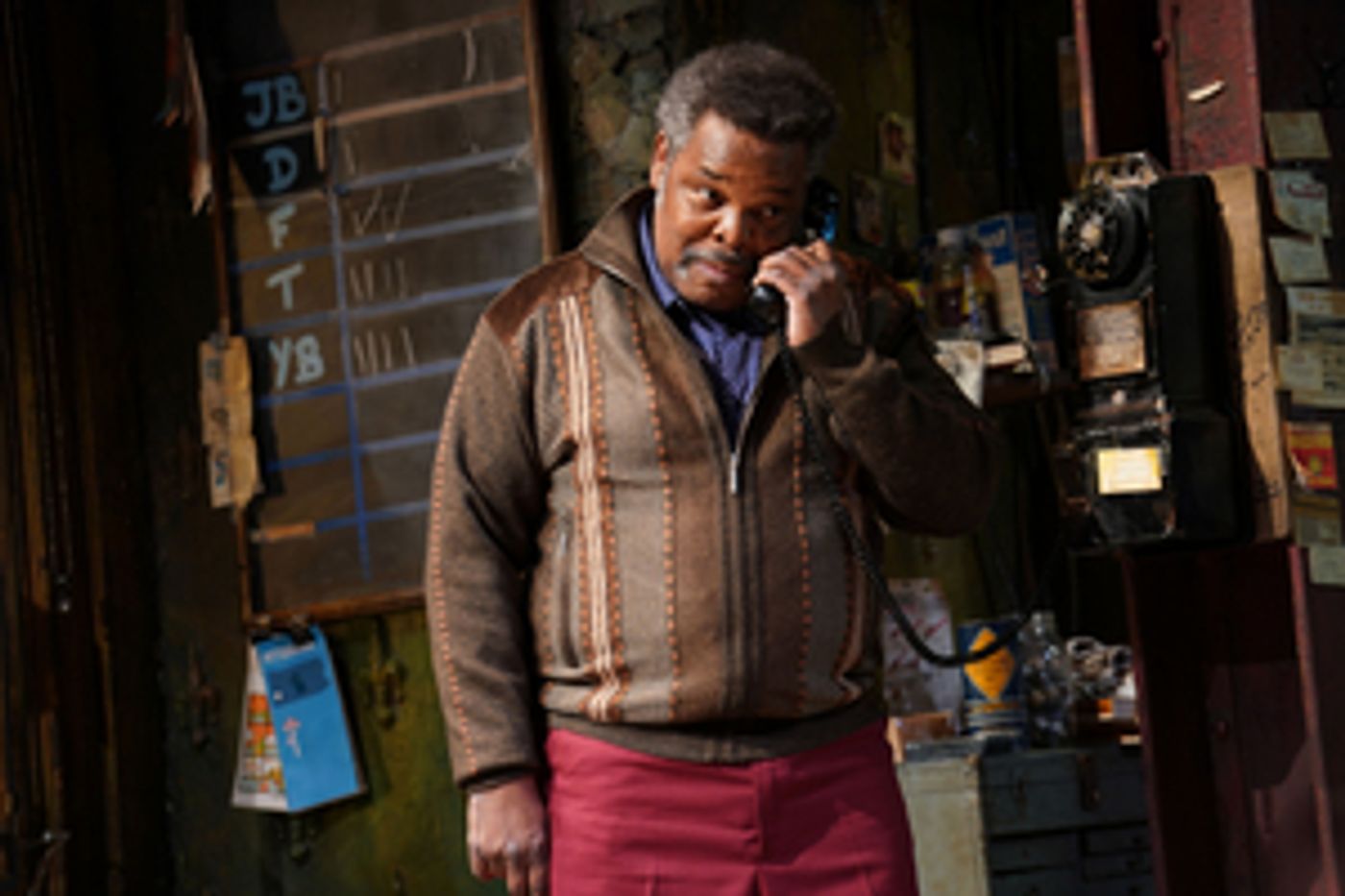 have been employed for years, earning a living on their own terms. Just answer the phone "Car Service," jot down the address, tell the customer the color of your car, check the job off on the tally board, and then go do the drive - over and over again. Come in to work when you want; leave when you want. Just try to get along with each other while there, and pay your monthly fee to be part of the team, sharing whatever part of your tax-free income is due to the boss while putting the rest in your pocket to spend however you want.
have been employed for years, earning a living on their own terms. Just answer the phone "Car Service," jot down the address, tell the customer the color of your car, check the job off on the tally board, and then go do the drive - over and over again. Come in to work when you want; leave when you want. Just try to get along with each other while there, and pay your monthly fee to be part of the team, sharing whatever part of your tax-free income is due to the boss while putting the rest in your pocket to spend however you want.
Beginning at a rather leisurely pace, JITNEY takes its time introducing us to the cast of characters 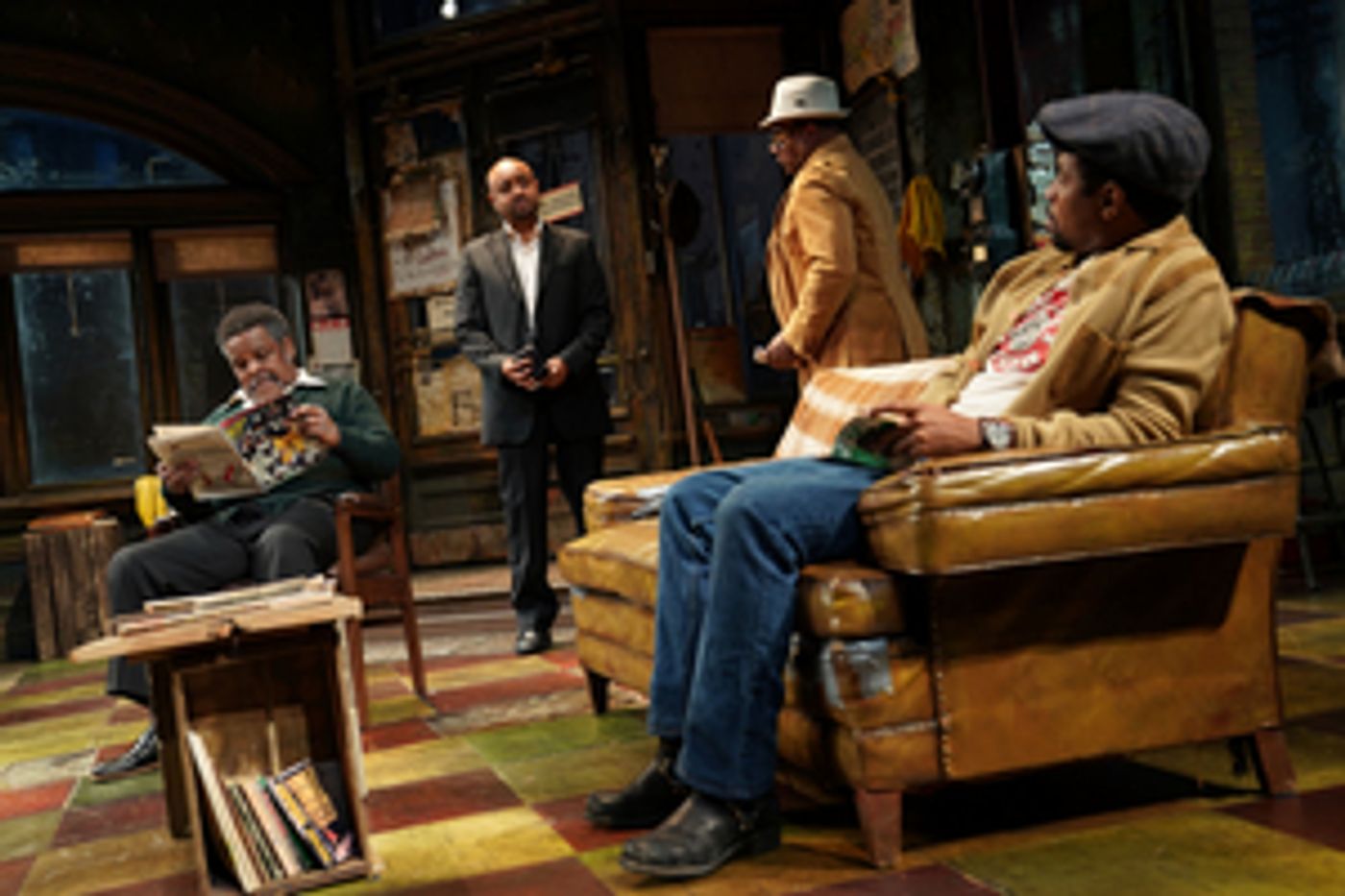 working and hanging out together in the one-room gypsy cab business office run by Becker (Steven Anthony Jones), a former mill worker who prides himself on owning his own business. His employees, who we learn about via their individual stories as they interact with the other characters, allow the audience an intimate view of the Pittsburgh working-class struggling to keep afloat in a time of great social change during the city's period of so-called "urban renewal," as the city tries to shut down businesses -- including the cab station -- to make way for a new, more upscale modern building
working and hanging out together in the one-room gypsy cab business office run by Becker (Steven Anthony Jones), a former mill worker who prides himself on owning his own business. His employees, who we learn about via their individual stories as they interact with the other characters, allow the audience an intimate view of the Pittsburgh working-class struggling to keep afloat in a time of great social change during the city's period of so-called "urban renewal," as the city tries to shut down businesses -- including the cab station -- to make way for a new, more upscale modern building
The newest driver, Youngblood (remarkably intense, attention-grabber Amari Cheaton) returned from serving in Vietnam and is striving to earn enough money to buy a house for his girlfriend Rena (Nija Okoro) and their 2-year old son. His nemesis seems to be the office gossip Turnbo (Ray Anthony Thomas), as he seems to enjoy focusing on everyone else's business and then sharing it with the "crew" to try and insert his own brand of morality into their lives.
Youngblood (remarkably intense, attention-grabber Amari Cheaton) returned from serving in Vietnam and is striving to earn enough money to buy a house for his girlfriend Rena (Nija Okoro) and their 2-year old son. His nemesis seems to be the office gossip Turnbo (Ray Anthony Thomas), as he seems to enjoy focusing on everyone else's business and then sharing it with the "crew" to try and insert his own brand of morality into their lives.
These are the first two characters we meet 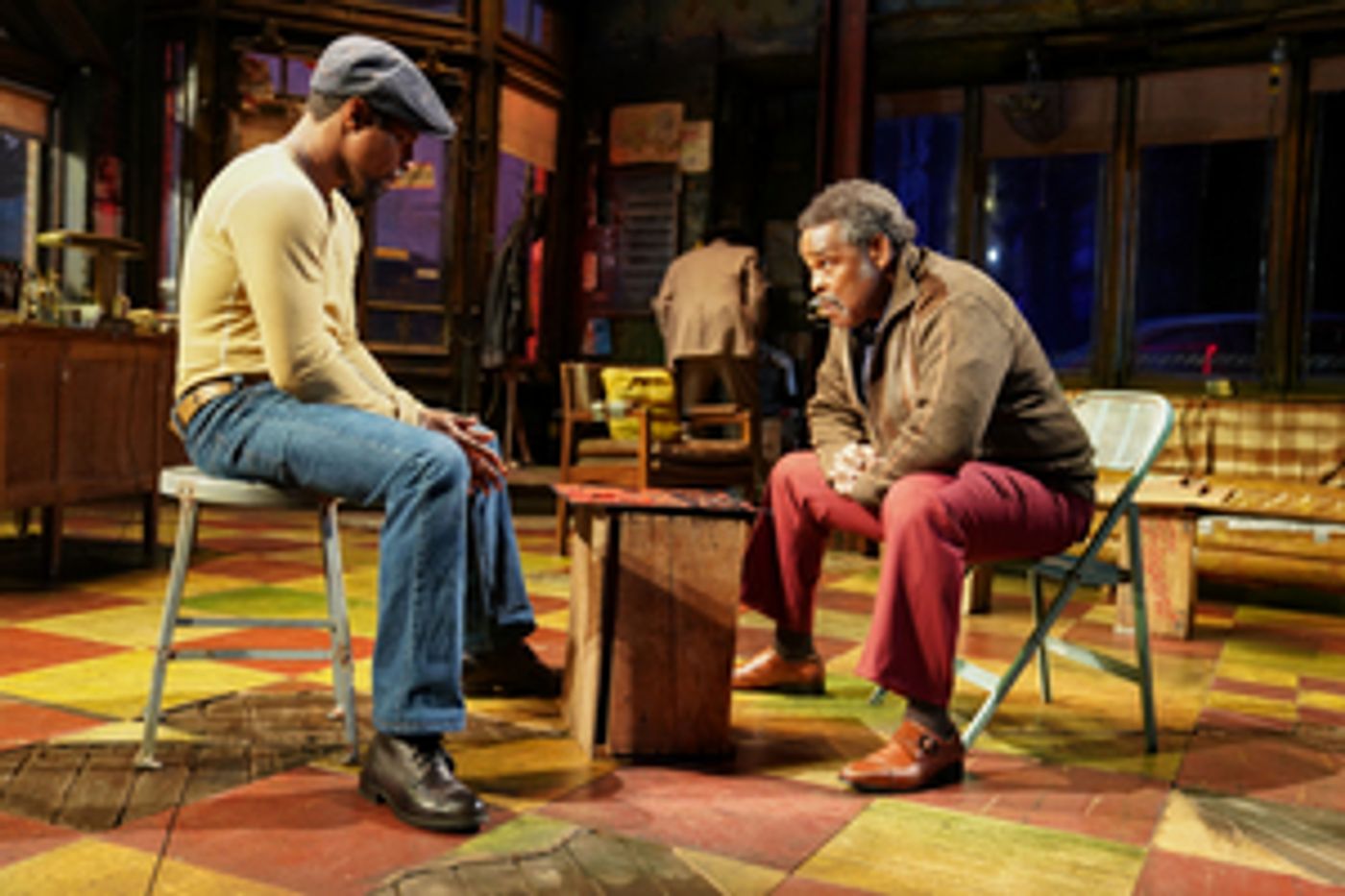 as they play a round of checkers, each insisting they know more about the game, ie: perhaps life too. Later on, Turnbo's questioning Youngblood's recent "hanging out" with Rena's sister almost ends a few lives as his version of what was going on is so far from the truth. The ensuing physical fight between the two men, directed by Thomas Schall, caused gasps in the audience with its realistic brutality which seemingly launched out of nowhere.
as they play a round of checkers, each insisting they know more about the game, ie: perhaps life too. Later on, Turnbo's questioning Youngblood's recent "hanging out" with Rena's sister almost ends a few lives as his version of what was going on is so far from the truth. The ensuing physical fight between the two men, directed by Thomas Schall, caused gasps in the audience with its realistic brutality which seemingly launched out of nowhere.
Recovering alcoholic Fielding (Anthony Chisholm), who used to be a tailor, 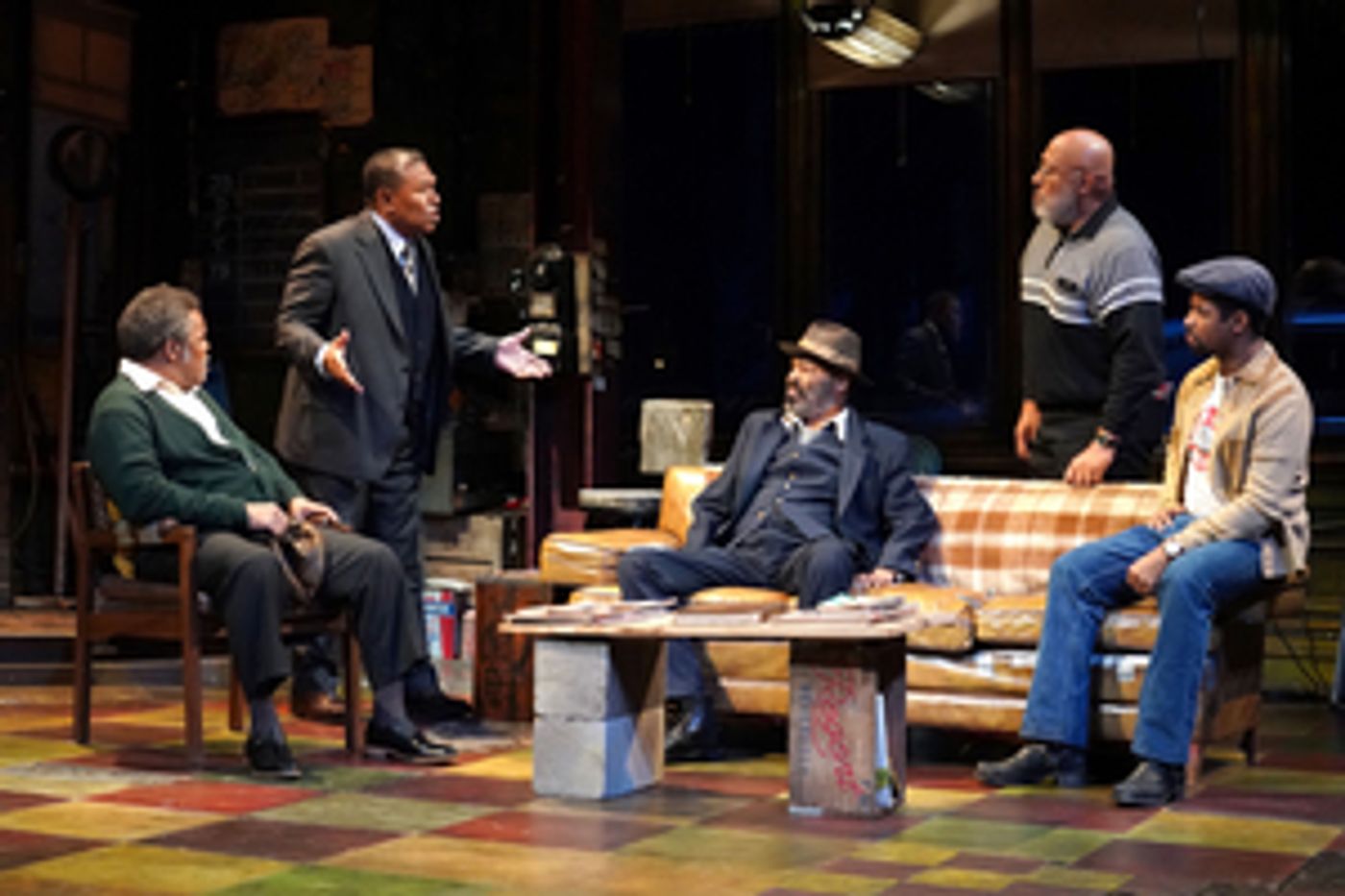 is waging an ongoing battle against his alcoholism, even as his continued drunkenness threatens his job, while continuously having his hand out looking to fill it with more money. Becker wants to fire him, knowing his drinking will eventually cause great problems with accidents, but just can't seem to get rid of his life-long friend who he knows will end up on the streets if not kept in his employ.
is waging an ongoing battle against his alcoholism, even as his continued drunkenness threatens his job, while continuously having his hand out looking to fill it with more money. Becker wants to fire him, knowing his drinking will eventually cause great problems with accidents, but just can't seem to get rid of his life-long friend who he knows will end up on the streets if not kept in his employ.
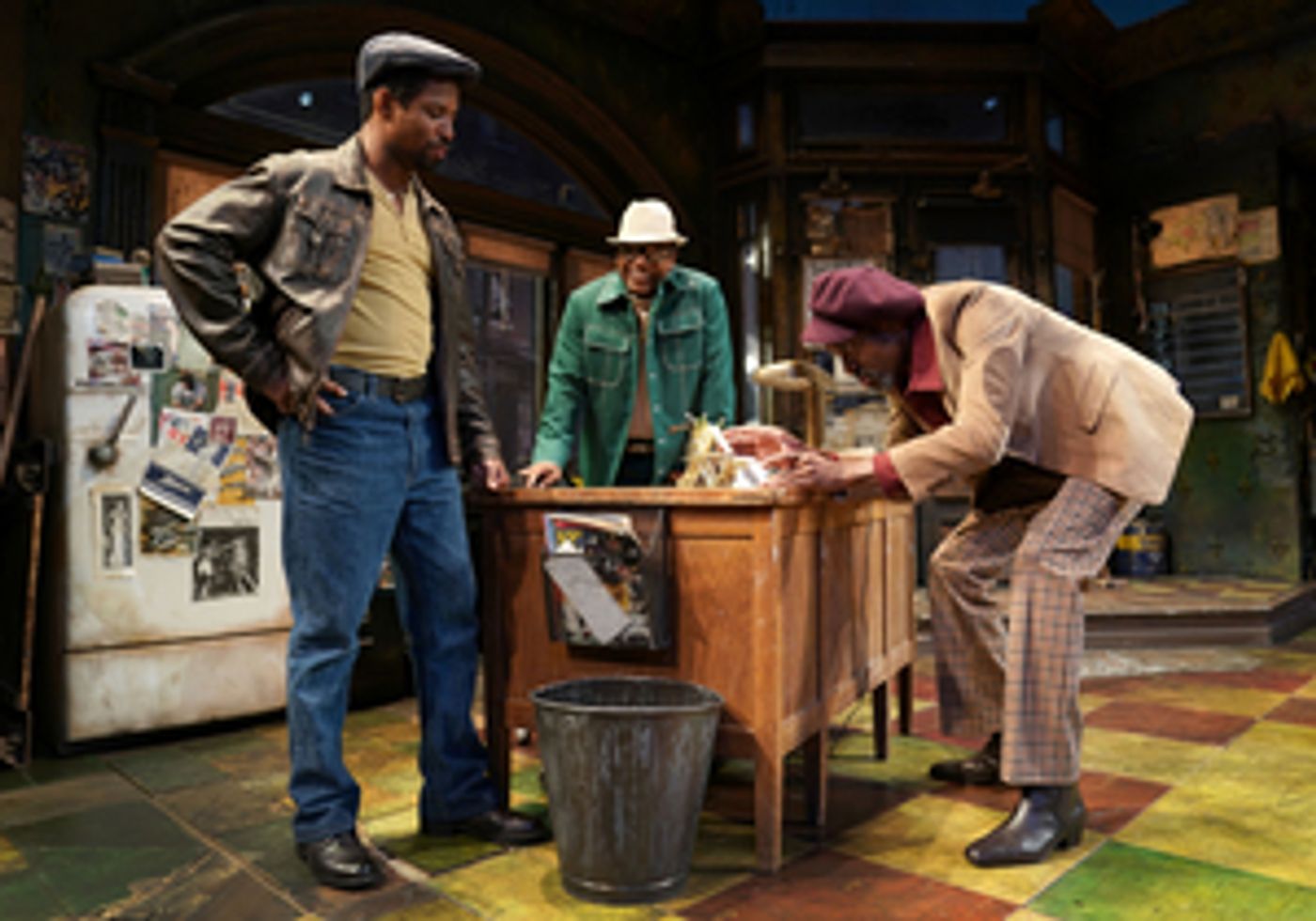 Local hotel doorman Philmore (Brian D. Coats) is perhaps the most stable of them all, proud of holding down his job for as long as he has without ever being late or missing a day. He drops by less frequently, adding in his own brand of insight on the white gentrification about to take place in the old neighborhood, wondering what type of employment may remain for black men in the area.
Local hotel doorman Philmore (Brian D. Coats) is perhaps the most stable of them all, proud of holding down his job for as long as he has without ever being late or missing a day. He drops by less frequently, adding in his own brand of insight on the white gentrification about to take place in the old neighborhood, wondering what type of employment may remain for black men in the area.
The philosophical, technical wizard Doub (Keith Randolph Smith), a Korean War Veteran and a longtime jitney driver, 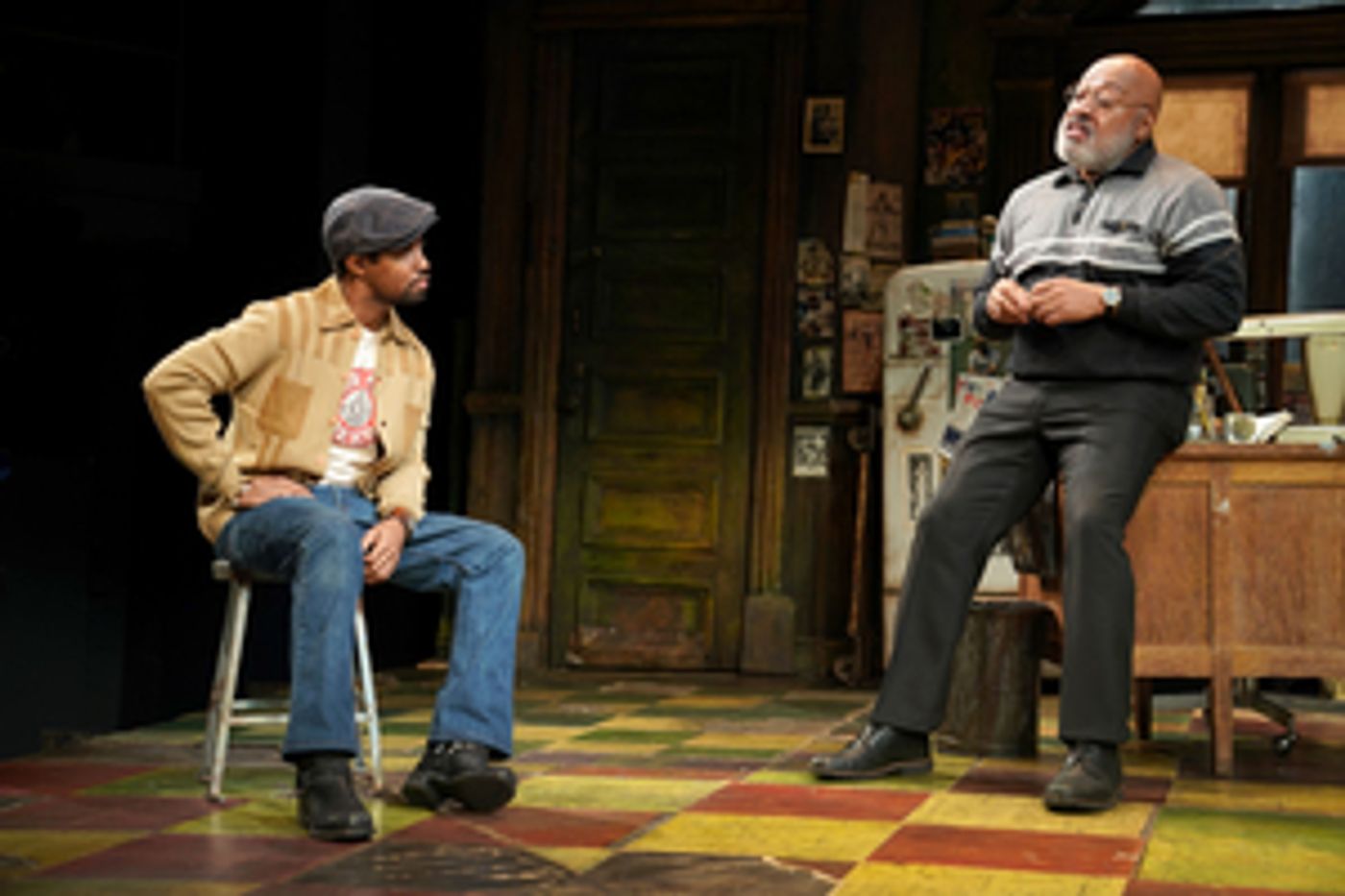 responds by equating his time at war where 'they never paid [him] no mind' to the experiences he and his black colleagues have with white men today. His monologue about the horrors he witnessed working in battlefield "detail and recovery" were frightfully chilling, reminding us all that with the glory of military service, and the benefits that follow, is the brutal reality of death at any moment.
responds by equating his time at war where 'they never paid [him] no mind' to the experiences he and his black colleagues have with white men today. His monologue about the horrors he witnessed working in battlefield "detail and recovery" were frightfully chilling, reminding us all that with the glory of military service, and the benefits that follow, is the brutal reality of death at any moment.
Also using the room as his personal office space is local hustler and numbers-runner Shealy (Harvy Blanks, dressed to the nines by costumer Toni-Leslie James, as a street-wise hustler and pimp) 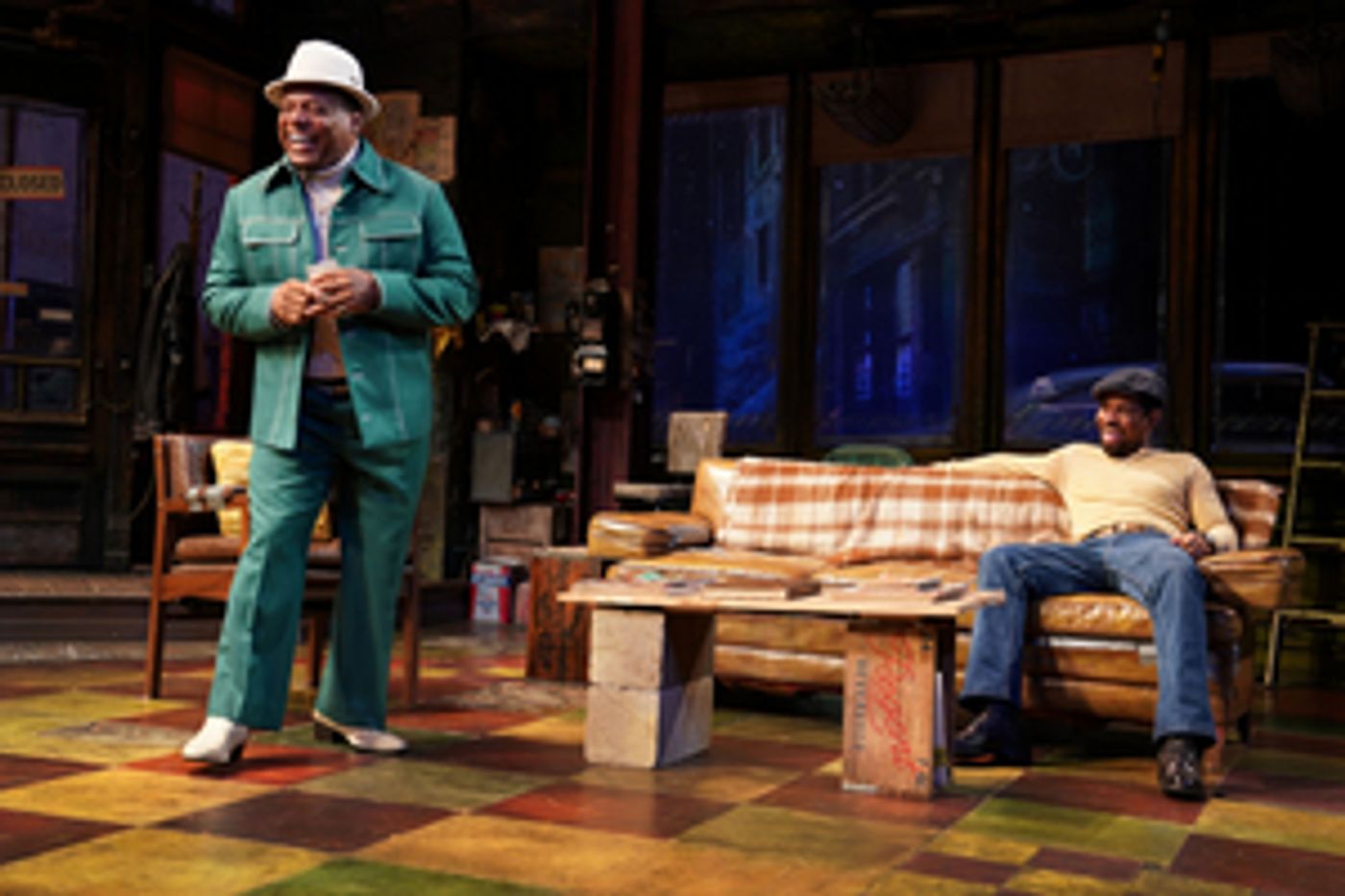 who shows up now and then to collect on a bet or brag to the other men about his recent conquests, although he admits in a moment of foreshadowing that "Women and money frequently kill people." Blanks is fun to watch, although his comments and social insights would be better understood if he would speak loud enough to always be heard. Then again, all the actors were difficult to hear at first, but thankfully the booth was alerted and the volume picked up to a more reasonable level as the play continued.
who shows up now and then to collect on a bet or brag to the other men about his recent conquests, although he admits in a moment of foreshadowing that "Women and money frequently kill people." Blanks is fun to watch, although his comments and social insights would be better understood if he would speak loud enough to always be heard. Then again, all the actors were difficult to hear at first, but thankfully the booth was alerted and the volume picked up to a more reasonable level as the play continued.
Just when it seems the play will be all talk, near the end of Act I, the boss' son Booster (handsome Francois Battiste) returns from 20 years in prison, 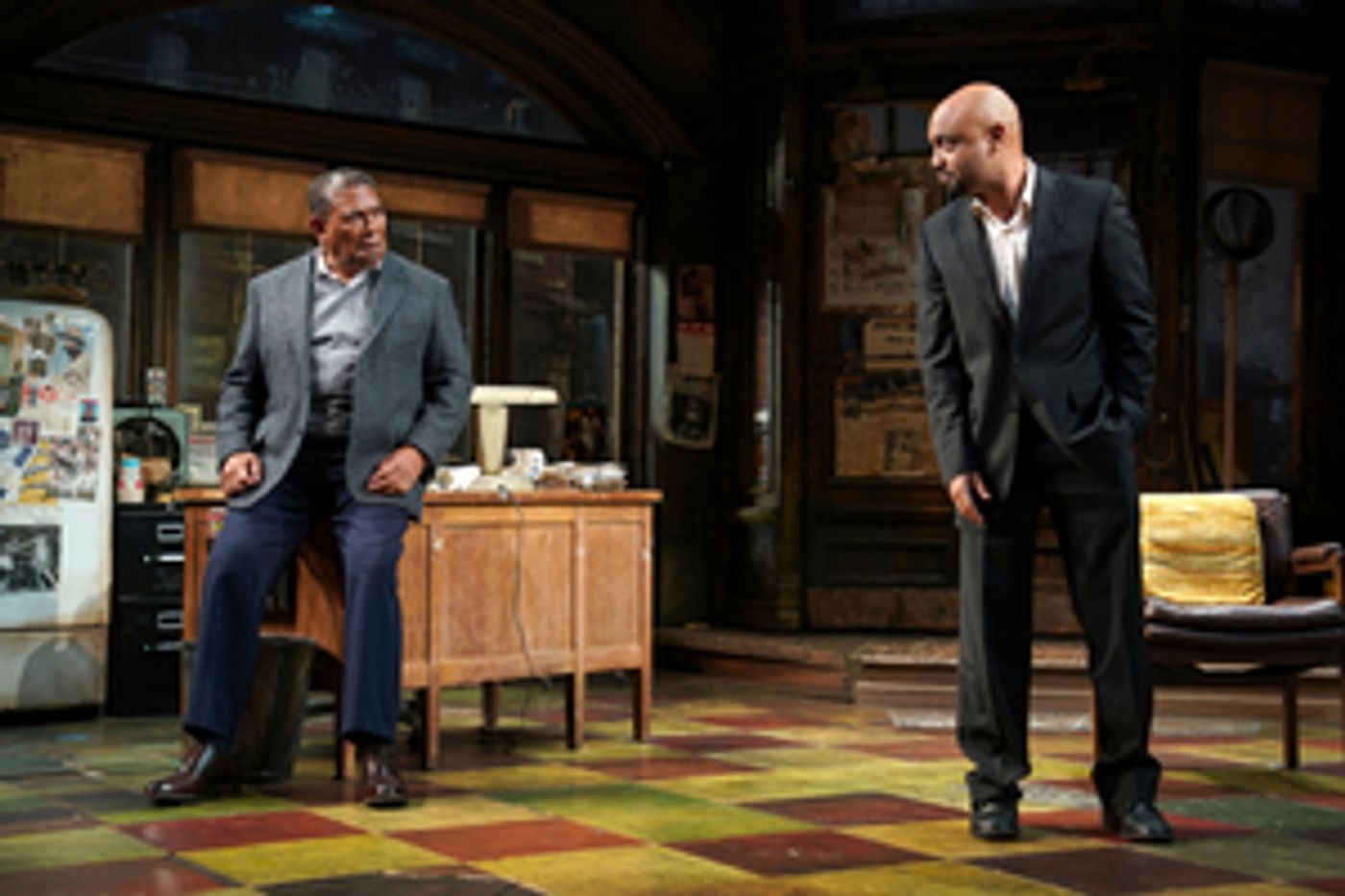 during which time his father Becker never visited him, believing his son's actions ruined the lives of their entire family. You see, Booster was an educated young man who fell in love with a young white woman from a rich family whose father attempted to pull them apart after discovering the lovers locked together in the back of a car. And when she called "rape" to justify her actions, Booster was arrested then managed to get a gun and shoot her dead for bearing false witness against him, sending him to jail for a crime he never committed. Sounds way too familiar, doesn't it?
during which time his father Becker never visited him, believing his son's actions ruined the lives of their entire family. You see, Booster was an educated young man who fell in love with a young white woman from a rich family whose father attempted to pull them apart after discovering the lovers locked together in the back of a car. And when she called "rape" to justify her actions, Booster was arrested then managed to get a gun and shoot her dead for bearing false witness against him, sending him to jail for a crime he never committed. Sounds way too familiar, doesn't it?
The scenes between Beck and Booster 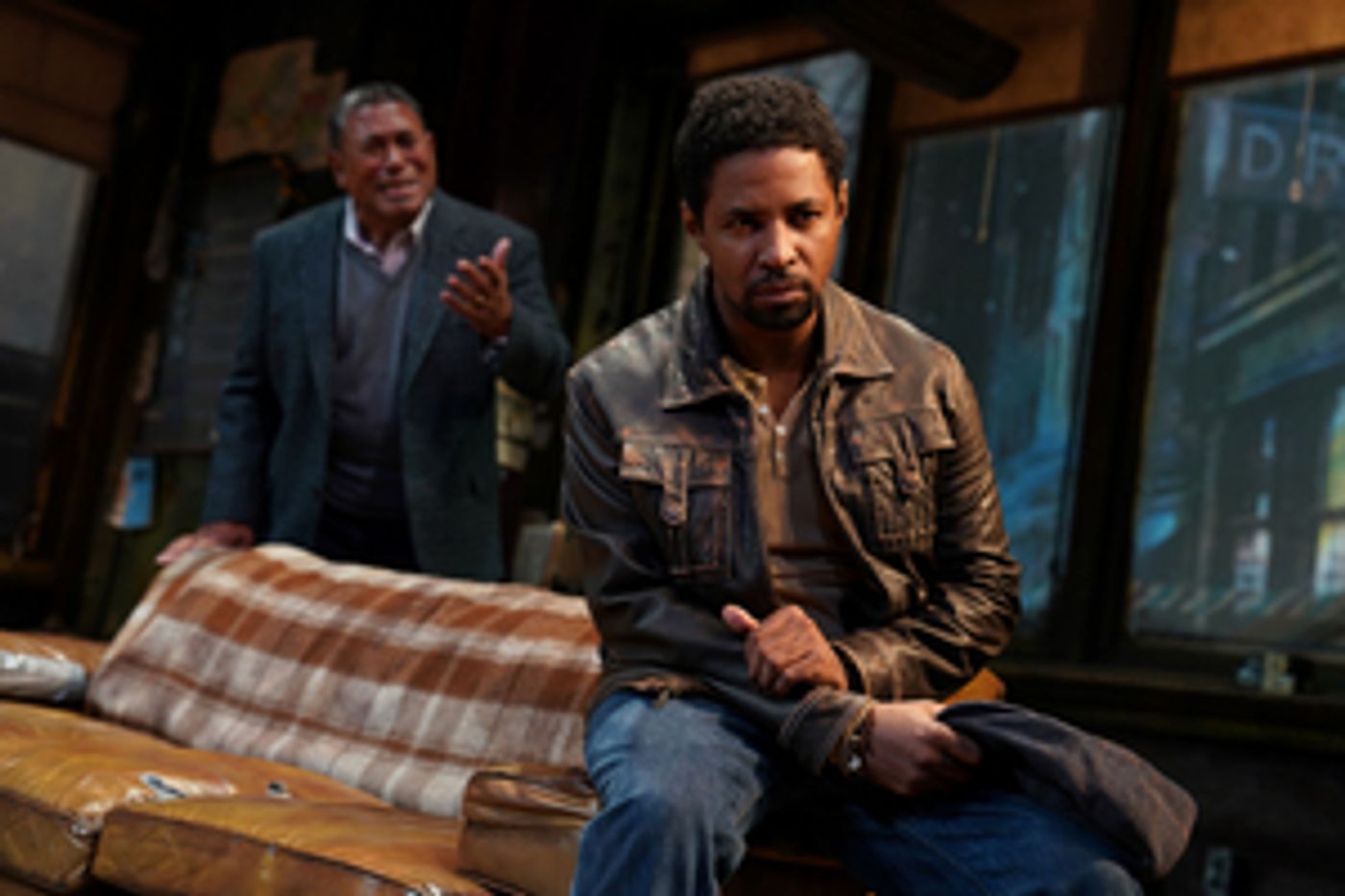 are the most intense in the play as tempers flare, potent secrets are revealed, and the fragile threads binding this makeshift family of jitneys together threaten to come undone at last. How things work out brilliantly ends the play, with Santiago-Hudson's emotionally revealing spotlight scene tugging at the heartstrings and generating a well-deserved standing ovation at the end.
are the most intense in the play as tempers flare, potent secrets are revealed, and the fragile threads binding this makeshift family of jitneys together threaten to come undone at last. How things work out brilliantly ends the play, with Santiago-Hudson's emotionally revealing spotlight scene tugging at the heartstrings and generating a well-deserved standing ovation at the end.
Presented by Center Theatre Group, performances for August Wilson's JITNEY 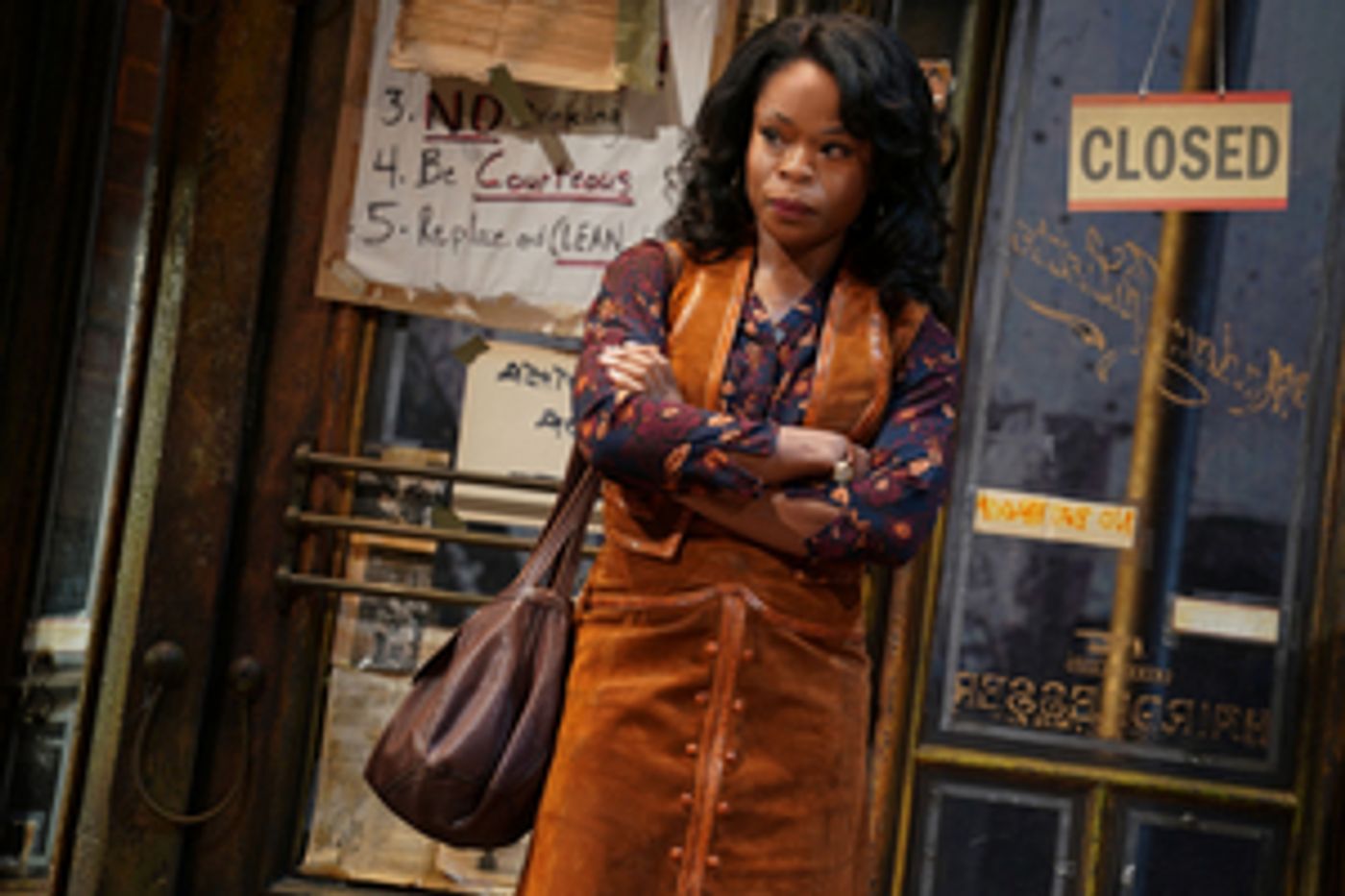 continue through December 29 in the Mark Taper Forum, located at The Music Center, 135 N. Grand Avenue in Downtown L.A. 90012. Tickets ranging from $25-$125 are available online at CenterTheatreGroup.org, by calling Audience Services at (213) 628-2772 or in person at the Center Theatre Group Box Office (at the Ahmanson Theatre at The Music Center in Downtown Los Angeles).
continue through December 29 in the Mark Taper Forum, located at The Music Center, 135 N. Grand Avenue in Downtown L.A. 90012. Tickets ranging from $25-$125 are available online at CenterTheatreGroup.org, by calling Audience Services at (213) 628-2772 or in person at the Center Theatre Group Box Office (at the Ahmanson Theatre at The Music Center in Downtown Los Angeles).
Photo credit: Joan Marcus
Reader Reviews
Videos

